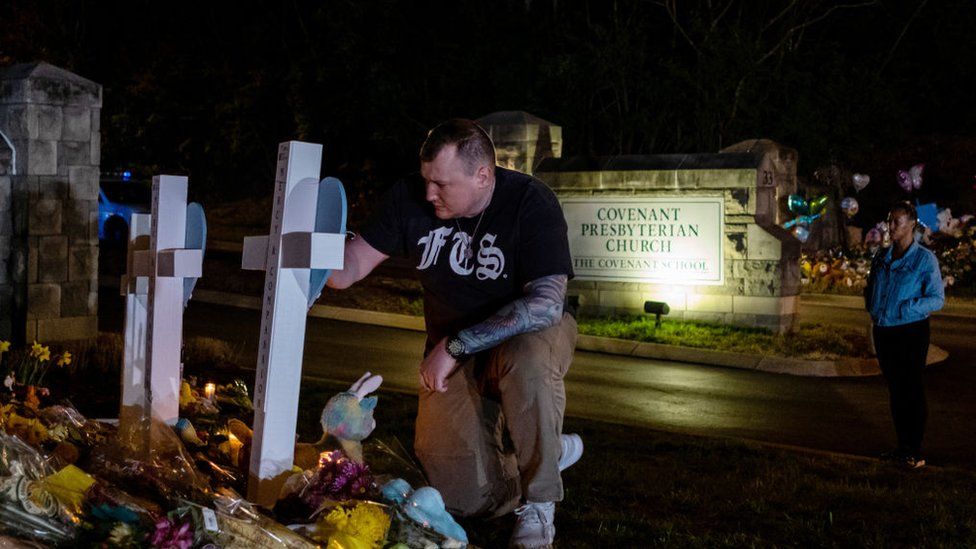The Americans who have lived through multiple mass shootings
- Published

Shaundelle Brooks says she worries about mass shootings every time she drops her son Aldane off at school.
It has been just five years since she lost her older son, 23-year-old Akilah DaSilva, in a mass shooting at a Waffle House in Nashville.
This week a shooter opened fire at a private Christian school in the city, sending her son Aldane into lockdown at his nearby high school.
"My heart dropped," Ms Brooks told CNN. "Here we are again, another mass shooting."
Ms Brooks and her family are part of a small cohort of people in the US who have been caught up in multiple mass shootings.
There is no data on how many people like this there are. But while mass shootings represent an extremely small portion of total gun violence incidents in the US, their impact is deep.
For those who have witnessed more than one instance of gun violence in their lifetime, there comes an even greater risk for serious mental health issues like depression and post-traumatic stress disorder, said Robin Gurwitch, a psychologist at Duke University Medical Center.
"The more exposure we have to traumatic events, the more they just build on each other," she said.
On a snowy November day in Michigan, high school student Emma Riddle had to run for her life after a gunman opened fire on her classmates.
She particularly remembers her freezing feet, as she was wearing old Vans trainers that she had thrown on in a rush that morning.
For months after the 2021 shooting in which four students died, Ms Riddle wore tennis shoes every single day, she said, just in case she was faced with another shooting.
Less than two years later, Ms Riddle, 18, found herself confronted with another mass shooting, this time at Michigan State University.
She and dozens of other Oxford High School students spent hours in lockdown as a gunman opened fire on campus, killing three people and injuring five.
"I'm always prepared," Ms Riddle told the BBC. "I always look at the exits if I'm in a building or to see if there's a window I can get out of or if there's a door I can quickly lock."
Ashbey Beasley was visiting Nashville at the time of the shooting at The Covenant School earlier this week. She and her son were survivors of last year's Highland Park shooting in Illinois, where seven people were killed.
She drove to one of the police press conferences in Nashville on Monday, and at the end of it approached reporters and asked: "How is this still happening? How are our children still dying, and why are we failing them?"
Survivor of Illinois shooting makes angry plea in Nashville
Mass shooting are the most prevalent source of stress cited by Americans in one 2019 survey, in which a third of adults said they avoided certain places and events as a result.
And recent polling suggests a majority of teenagers in the US are worried about a shooting happening at their school.
An increase in media coverage of these events has likely contributed to a sense of panic, said James Alan Fox, a professor at Northeastern University who maintains a USA Today database on mass killings. "It feels like it's happening all the time, but it isn't," he said.
But every mass shooting also has extensive ripple effects on victims' family, friends and communities, said Charles Branas, the chair of the Department of Epidemiology at Columbia University Mailman School of Public Health.
Even those who have not witnessed gun violence but have had to go into lockdown due to false threats of a shooting have been forever changed by the event, said James Densley, a British-American co-director of the Violence Project, a research centre that tracks US shootings.
Americans have also become subject to a type of secondary "vicarious" trauma, as children take part in mass shooting drills in schools and others are forced to relive mass shootings on social media, where they are bombarded with imagery, he said.
For those who have had to relive their trauma by witnessing a second mass shooting, these negative effects are multiplied, said Ms Gurwitch. "Now it's not one shooting, but two, and I'm going to be thinking when I turn the corner, will there be three and four and five?"
Ms Riddle said she had previously learned how to compartmentalise the tragedy at her high school, working to cope with the grief over time.
But exposure to multiple mass shootings in two places she calls home over the course of less than a year-and-a-half has disrupted her healing process, she said.
"When you're dealing with the emotions and trying to process everything, you support yourself by saying 'This is done. You never have to go through this again. You never have to go to your friends' vigils again, your friends' funerals,'" said Ms Riddle.
"It'll be a really long time before I'm back to feeling like I was before these two events."
- Published29 March 2023
- Published28 March 2023
- Published29 March 2023